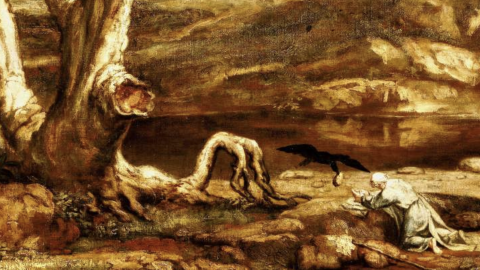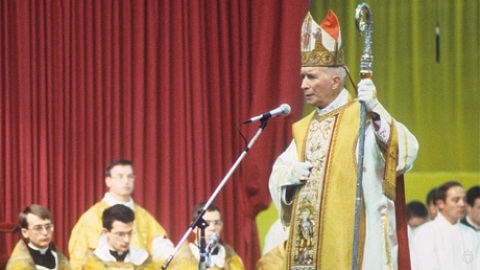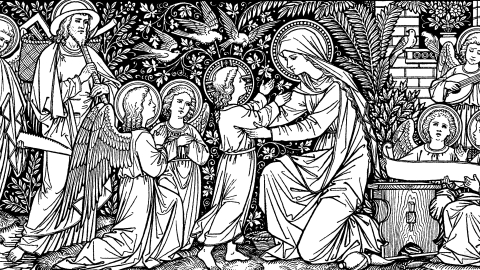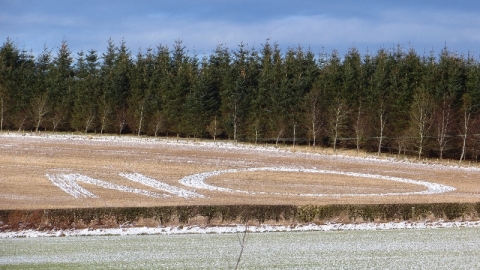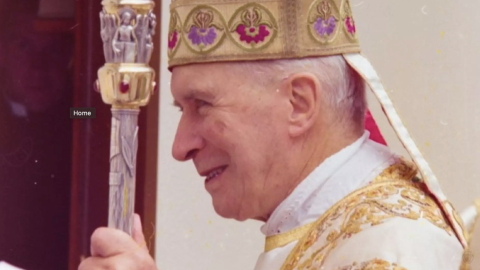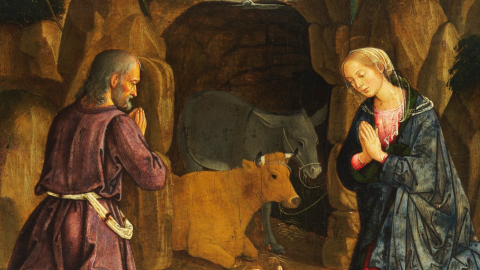Martin at Eid Al Addah Festival

On 31st July 2020, the Archbishop of Dublin and Primate of Ireland, Diarmuid Martin, was present as an official guest at the Islamic celebration of Eid Al Addah held in Croke Park, Dublin.
In an address which was published on the website of the Irish Catholic Bishops’ Conference, Archbishop Martin stated:
“I am honoured that you have kindly asked me as Archbishop of Dublin, the leader of the Catholic Community of believers in Jesus Christ here in Dublin, to be part of your celebration... I am humbled by the spiritual hospitality I receive here this morning and I thank you...”[1].
The Archbishop’s entire address is in line with the relativism of these sentiments: the overall sense given is that Islam and Catholicism are two paths towards worship of the same God. For example:
“In a world where many have difficulty in finding faith in God, we all have to examine our individual conscience as to how we have failed to show convincingly in our own lives that God is not just an abstract distant figure, but the One who teaches us all what mercy and compassion mean”[2].
At no point does Archbishop Martin affirm the essential teachings which separate Catholicism and Islam: for example, the Blessed Trinity and the Divinity of Jesus Christ (both of which Islam explicitly rejects), the necessity of Baptism and membership of the Church for salvation (at least implicitly rejected by Islam). At no point does he call on his Islamic audience to turn from its error and embrace the One True Faith brought to us by Jesus Christ.
An Act of Continuity
Though the Archbishop’s words and acts are scandalous (since they encourage indifferentism among Catholics and reassure Muslims in their error), they are unfortunately in perfect continuity with the words and acts of the reigning Pontiff, Pope Francis. Indeed, Archbishop Martin himself quotes the Pope no fewer than three times during his Croke Park address – for example, the Pontiff’s words in a mosque in Azerbaijan in 2016:
“Meeting one another in fraternal friendship in a place of prayer is a powerful sign, one that shows the harmony which religions can build together, based on personal relations and on the good will of those responsible”[3].
But Pope Francis’ words and acts in relation to Islam are, in turn, in continuity with the attitude of his own predecessors on the See of Peter, notably (but not exclusively) Pope John Paul II. As Cristina Siccardi noted in Correspondenza Romana of 20thNovember 2019:
“We must not think that the interreligious citadel is an original and avantgarde idea of Pope Francis’ pontificate. It comes from the ‘spirit of Assisi’—which was not, is not and can never be the spirit of St. Francis of Assisi—in 1986, when John Paul II gathered all the representatives of the most important religions of the world to pray, in human fraternity, for peace in the world”[4].
However, neither did this same “spirit of Assisi” come out of thin air:
“This ‘spirit of Assisi’ has its roots in the Second Vatican Council, as evidenced by the document Nostra Aetate (October 28, 1965), which opened interreligious dialogue, cancelling the pedagogical mission of the Church to condemn religious errors”[5].
This spirit is, in the words of Archbishop Carlo Maria Viganó “the fruit of the pantheistic and agnostic neo-modernism that tyrannizes the Roman Church, germinated from the Council document Nostra Aetate”[6].
The Catholic Attitude: “Going therefore, teach ye all nations”
While Archbishop Martin, Pope Francis and his predecessors are in continuity with Nostra Aetate, the Council document itself is not in continuity with the Church’s Traditional teaching and attitude, typified in Pope Pius XI’s encyclical Mortalium Animos. Speaking of such interreligious initiatives, Pope Pius XI said:
“Such attempts can nowise be approved by Catholics, founded as they are on that false opinion which considers all religions to be more or less good and praiseworthy, since they all in different ways manifest and signify that sense which is inborn in us all, and by which we are led to God and to the obedient acknowledgment of His rule. Not only are those who hold this opinion in error and deceived, but also in distorting the idea of true religion they reject it, and little by little, turn aside to naturalism and atheism...”[7].
The true Catholic attitude is to listen to and obey the words of Jesus Christ: “Going therefore, teach ye all nations: baptizing them in the name of the Father and of the Son and of the Holy Ghost”. This is to follow the examples of those who have gone before us: for instance, Saint Francis of Assisi, the Franciscan martyrs of Morocco, and Pope Pius II (who wrote to Sultan Mohammed II to encourage him to convert to the One, True Faith).
We should make our own the sentiments expressed by Father Davide Pagliarani, Superior General of the Society of Saint Pius X in his communiqué of 25th February 2019:
“An ecumenical Christ would not be the true Christ. For more than fifty years, modern ecumenism and interreligious dialogue have ceaselessly presented to the world a diminished, unrecognizable, and disfigured Christ...
“It is a truth of the faith that Christ is King of all men and that He wants to unite them in His Church, His unique Bride, His only Mystical Body. The kingdom that He establishes is a reign of truth and grace, of holiness, justice, and charity, and consequently peaceful. There can be no true peace apart from Our Lord. It is therefore impossible to find peace outside the reign of Christ and of the religion that He founded. To forget this truth is to build on sand, and Christ Himself warns us that such an undertaking is doomed to fail”[8].
To conclude, in the words of Father Guillaume Gaud SSPX, Rector of Saint Curé d’Ars Seminary, Flavigny, France:
“We must maintain the Church’s universal traditional method: the integral preaching of the Catholic Faith, accompanied by an immense charity and devotion...”[9].
[1] www.catholicbishops.ie/2020/07/31/words-of-greeting-of-archbishop-diarm…
[2] Ibid.
[3] Ibid.
[4] https://fsspx.news/en/news-events/news/abu-dhabi-babel-abrahamic-family…
[5] Ibid.
[6] Ibid.
[7] Ibid.
[8] https://www.fsspx.ie/en/news-events/news/communiqu%C3%A9-superior-gener…
[9] https://laportelatine.org/documents/crise-eglise/oecumenisme/faut-il-co…
